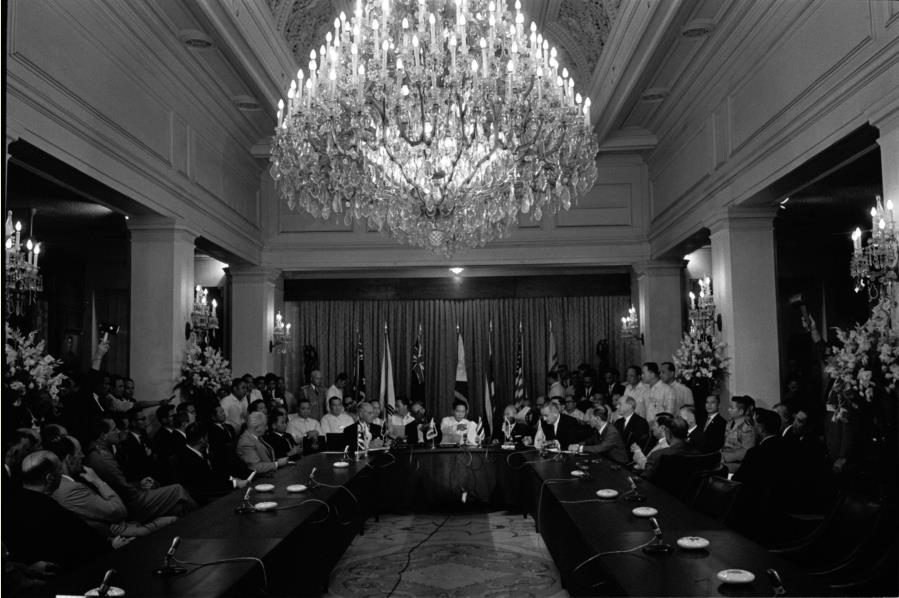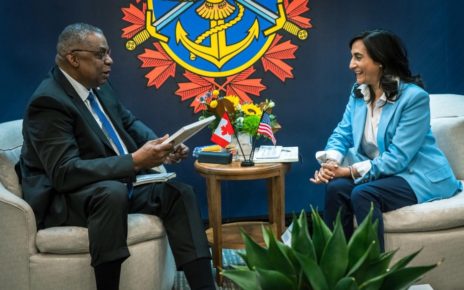FOIP and RBIO Under Threat
While many of the North Atlantic Treaty Organization (NATO) member-states are heavily preoccupied with providing military assistance to Ukraine’s self-defence against Russia’s war of aggression in the eastern flank, the latest string of events in the Indo-Pacific is a growing cause of concern that could spark a regional armed conflict in the western flank. Under President Xi Xinping, the People’s Republic of China (PRC) has adopted wolf warrior diplomacy in its bid to reassert its regional hegemony, upend the free and open Indo-Pacific, and undermine the rules-based international order: First, it has exerted political, diplomatic, military, and economic pressure against the democratically-elected government of outgoing President Tsai Ing-wen of Taiwan under the pretext of “national reunification”, and is poised to intensify its intimidation campaign under the incoming President Lai Ching-te. Second, it has militarized the Paracel and Spratly Groups of Islands, seized Panatag (Scarborough) Shoal from the Philippines, and invalidated the result of 2016 Arbitral Tribunal award under the United Nations Convention on the Law of the Sea (UNCLOS) in favor of Manila. Third, it has deployed coercive gray-zone tactics to assert control over the sea lanes of communication (SLOCs) and impose its territorial and maritime sovereignty over the South China Sea and the East China Sea. Meanwhile, North Korea under its Supreme Leader Kim Jong Un has made substantial technological progress in its nuclear weapons development program. He approved a new nuclear weapons law in September 2022 which has enshrined the “irreversibility” of Pyongyang’s nuclear status, guaranteed its right to deploy preemptive nuclear strikes, and facilitated the testing of new types of nuclear weapon delivery systems aimed against three “NATO Plus” alliance members: South Korea, Japan, and the United States.
The Resurgence of Minilateralism
As a result of the growing assertiveness of both the PRC and North Korea to alter the status quo to their strategic advantage, minilateralism is back in vogue in the Indo-Pacific region. According to William Taw, minilaterals pertain to informal and more targeted initiatives aimed at addressing a “specific threat, contingency or security issue with fewer states (usually three or four) sharing the same interest for resolving it within a finite period of time.” For Nickolay Mladenov, the notable characteristic of minilateralism is its emphasis on convergence of interests over values or ideology which provides nations with greater flexibility to collaborate on critical issues that affect member-states. Interestingly, the United States together with its key security allies and partners in the region have entered into various minilateral security arrangements, with each aiming to address a specific set of challenges, and sometimes, within certain geographic areas of concern.
First, the United States, Australia, India, and Japan resurrected the US-Australia-India-Japan Quadrilateral Security Dialogue (QUAD) in September 2021 after a 13-year hiatus. In its latest form, QUAD member-states aim to enhance their economic resilience and reduce their dependence on autocratic states in areas such as critical and emerging technologies, global health, climate, infrastructure, space, cybersecurity, and maritime security. One of their most recent maritime security breakthroughs is the Indo-Pacific Partnership for Maritime Domain Awareness, which provides partners in Southeast Asia, the Indian Ocean, and the Pacific Ocean with near real-time information on activities in their maritime zones. It uses cutting-edge technologies, such as commercial satellite radio frequency data collection for such purpose.
Second, the United States, Australia and United Kingdom pressed ahead with the US-Australia-US Trilateral Security Partnership (AUKUS) also in September 2021, as a trilateral defence and security partnership. AUKUS has two main pillars or lines of effort: supporting Australia in the acquisition of its first conventionally armed, nuclear-powered submarine fleet; and enhancing mutual cooperation in eight advance military capability areas, such as artificial intelligence (AI), quantum technologies, innovation, information-sharing, and cyber, undersea, hypersonic and counter-hypersonic and electronic warfare domains.
Third, the United States, Japan, and South Korea forged the US-Japan-South Korea Trilateral Security Partnership in August 2023 which is the culmination of Washington’s diplomatic efforts to bring its two closest allies together. Last year, the three member-states conducted maritime ballistic missile defence warning test for real-time sharing of missile warning data, and vowed to hold annual, multi-domain trilateral exercises to enhance the coordination and cooperation of their defensive capabilities. Then during their first Indo-Pacific Dialogue held in January 2024, three countries agreed to expand the geographic scope of their security cooperation beyond the Korean Peninsula to include deterring Beijing from escalating threats in the South China Sea and the Taiwan Strait.
Another interesting development that is worth watching closely is the Philippines taking a proactive role in overcoming the political impasse within the Association of Southeast Asian Nations (ASEAN), and possibly forging a minilateral security arrangement with like-minded ASEAN member-states that are impacted most heavily by the PRC’s saber-rattling in the South China Sea. In September 2022, Philippine President Ferdinand Marcos, Jr. met with his Indonesian counterpart, President Jokowi Widodo, and signed an enhanced defence and security cooperation agreement and a five-year diplomatic plan, and agreed to expedite the review of their maritime borders arrangements. Then during the state visit of President Marcos, Jr. to Hanoi in January 2024, he and Vietnamese Prime Minister Pham Minh Chinh agreed to broaden cooperation between their coast guards, enhance information-sharing and training exchanges between their militaries, and prevent incidents in the hotly contested waters.
Critical Analysis
The proliferation of such minilateral security groupings of countries with shared concern over the PRC’s and North Korea’s assertive posture may be viewed as a welcome development, as these initiatives support member-states in: (1) developing a common operational picture on highly disputed geographical areas; (2) improving coordination, cooperation and collaboration among their respective government agencies, bureaus and offices; (3) improving their supply chain integration; (4) bolstering strategic communications and interoperability for rapid response to common security threats; and (5) enhancing their economic de-risking strategies amidst the growing political uncertainty in the region. However, I argue that having multiple, distinct, and sometimes overlapping minilaterals may have its limits in guaranteeing the long-term, collective security of the Indo-Pacific democracies. Under the status quo, these minilateral groupings function as ad hoc aggregations of loosely networked democratic states that tend to dissect the various facets of the structural challenge posed by the PRC and North Korea in the region. They constrain the member-countries’ ability to act as a cohesive and integrated whole that is capable of addressing the full spectrum of interconnected military, political, and economic security risks and threats posed by these autocratic states. This gives Beijing and Pyongyang greater maneuvering ability to violate the sanctity of international law as the legal-constitutional basis for the peaceful settlement of territorial and maritime disputes, drive multiple wedges among their neighboring countries, and exploit the internal divisions within the latter’s domestic political affairs. For example, the PRC has leveraged on its robust bilateral ties with Cambodia and Lao PDR to check the Philippines’ diplomatic efforts within ASEAN to forge a common stand on the South China Sea squabble. It has also thrown its support for pro-Beijing populist leaders, such as former Philippine President Rodrigo Duterte who once flirted with the idea of—and almost succeeded in—terminating the Visiting Forces Agreement with Washington.
Furthermore, with the lack of an institutionalized, collective defence treaty, the Indo-Pacific democratic middle powers continue to depend asymmetrically on their respective bilateral security guarantees afforded by Washington, such as the 1951 Mutual Defence Treaty between the United States and the Philippines, the 1951 Treaty of Mutual Cooperation and Security between the United States and Japan, and the 1953 Mutual Defence Treaty between the United States and South Korea, and the Taiwan Relations Act of 1979. As a result, these nations fall short in harmonizing their deterrence and defence policies as well as strategic planning and operations, which could lead to the establishment of a seamless, integrated defensive network along the First Island Chain. To illustrate this, consider the hypothetical, two-layered installation of the Phased Array Tracking Radar for Intercept on Target (PATRIOT) and Terminal High Altitude Area Defence (THAAD) missile defence systems not only in South Korea, but also in Japan, Taiwan, and the Philippines. This would extend the missile defence shield capable of shooting aircraft and thwarting short-, medium-, and intermediate-range missiles fired not only from North Korea but also from PRC. This would complicate the latter’s possible plan to establish aerial dominance in three distinct yet interconnected theaters of conflict, namely the South China, Taiwan Strait and East China Sea in the event of a regional war.
Laying the Groundwork for the Indo-Pacific Treaty Organization
In his compelling book, The Tragedy of Great Power Politics, followed by his op-ed piece with The Australian, “The Rise of China Will Not Be Peaceful At All”, John Mearsheimer, the main proponent of offensive realist theory in International Relations, once predicted that the rise of a revisionist PRC will attempt to reconstruct the global order, maximize its power gap with neighboring countries, and adopt a similar “Monroe Doctrine” by pushing the United States out of the Asia-Pacific region. He foresaw that this will then compel Washington to advocate for a parallel alliance structure with Beijing’s neighbors akin to NATO, and coordinate the strategic efforts of the balancing coalition. Two decades later, could Mearsheimer’s prediction become a self-fulfilling prophecy? In December 2023, a group of American politicians led by Republican Representative Mike Lawler of New York asserted that: “Our adversaries—China, Russia, Iran and North Korea—have forged an unholy alliance to disrupt and destabilize the globe.” In response, he submitted the Indo-Pacific Treaty Organization Act which seeks to establish a fact-finding panel that would supplant the hub-and-spokes model with an Indo-Pacific version of NATO to better deter Chinese and North Korean aggression. He asserted that: “A collective security agreement has the potential to deter aggression and protect the forces of democracy in the Indo-Pacific.”
Given the inherent systemic constraints of current minilateral security arrangements in addressing the plethora of structural challenges brought about by the PRC and North Korea, like-minded democracies in the Indo-Pacific region may seriously examine the feasibility of Rep. Lawler’s proposal of creating a formal politico-military alliance. Dubbed as the Indo-Pacific Treaty Organization (IPTO), this envisioned supra-national security organization shall serve as the common platform for the member-states to weave together their defence and security policies, and harmonize strategic planning and operations in response to region-wide issues of common concern. Possible candidate members for such organization may include, but are not limited to, the United States, Canada, the AP4 (Japan, South Korea, Australia, New Zealand), the Philippines, and Taiwan.
Drawing invaluable lessons from its defunct predecessor, the Southeast Asia Treaty Organization (SEATO), the IPTO could bring together like-minded democracies under a formal multilateral treaty organization. This would consolidate the gains from the existing minilateral security arrangements, and help create standardized rules, unified systems, and common practices for enhanced interoperability, integrated deterrence, and collective defence akin to Article 5 of the Washington Treaty. Under IPTO, member-states could jointly tackle region-wide traditional security challenges, such as territorial and maritime disputes and nuclear proliferation, as well as non-traditional security issues, such as terrorism, transnational crime, illegal, unreported and unregulated fishing (IUU), cyberattacks, pandemic, and climate change. It may opt to democratize its organizational structure through regular high-level ministerial consultations among member-states, design and establish a clear and coherent multi-national military command-and-control structure, and demonstrate its relevance through proactive response to hybrid, conventional and nuclear security threats from the PRC and North Korea.
Perhaps it is about time that Washington, together with its various security allies and partners in the region, consider such a policy proposal to ensure a free and open Indo-Pacific, and defend the rules-based international order outside of the Western hemisphere. As the old Latin saying goes, “Concordia res parvae crescunt.” (“Unity makes strength.”)
Photo: President Ferdinand Marcos presiding over a meeting during the Manila Conference of SEATO nations on the Vietnam War, at the Malacanang Palace, Manila, Philippines (1966) by Yoichi Okamoto via Creative Commons licensed under CC Attribution 2.0 Generic.
Disclaimer: Any views or opinions expressed in articles are solely those of the author and do not necessarily represent the views of the NATO Association of Canada.





